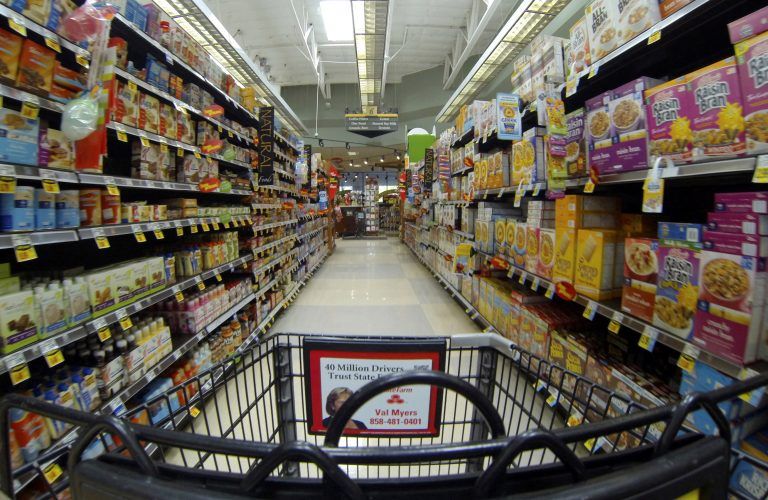
As inflation continues to plague the Greek economy, with food costs straining already struggling households, OT.gr identifies the 14 main reasons driving rising costs.
According to the analysis, based on examining a slew of aggregated data from the Hellenic Statistical Authority (ELSTAT), and analyses from economists and scientific organizations, persistent inflation is rooted in 14 causes with 8 of these reflecting long-standing problems in the Greek economy and market.
The Greek economy is facing 8 chronic impediments fuelling inflation which can be distilled to a mix of Greed for profits by businesses “Greedflation”, dependence on domestic production and consumption on imports, the pandemic, the energy and climate crisis, along with low wages.
According to economists and market pundits, food prices are expected to remain at high levels globally. However, in Greece, the impact of inflation is anticipated to be more pronounced, primarily due to low wages. The sources of inflation in Greece are numerous and are rooted in structural weaknesses, including:
- Οngoing challenges in the supply chain, contributing to increased costs.
- The economic downturn and financial constraints faced by consumers.
- Import dependencies, affecting pricing dynamics in the domestic market.
- Oligopolistic market structures result in limited competition.
- Fluctuations in international commodity prices influence local costs.
- External factors like geopolitical events affect the availability of goods.
- Inefficient agricultural practices affect local production and supply.
- Climate-related challenges impacting agricultural productivity.
- The intricate network of intermediaries in the distribution chain.
- Regulatory issues and taxation affect the overall cost structure.
- Despite measures taken by the government to buttress Greek households, economists concluded, speaking to OT that if real income did not rise “inelastic demand” – a metric measuring the unchanged consumer buying habits despite price fluctuations – for food products and essential goods would continue to “feed” high costs.
According to the official data from the Hellenic Statistical Authority (ELSTAT), food prices increased by 30% from May 2021 to November 2023 reflecting the current economic situation in the country.
The novel idea of “Greedflation” – a controversial and often polarizing theory that claims businesses exploit inflation to create excessive profits – is also cited by some domestic institutions, like the Bank of Greece (BoG), as well as international entities as a possible reason for dogged inflation.
This is because high profits further fuel the rise in prices within an environment of extensive inflation. Calls have been made to heighten controls to combat profiteering, while businesses are urged to limit profit margins wherever possible.
An Alpha Bank report underlines the inflation risks linked to geopolitical tensions, substantial wage increases, and the fiscal cost of extreme weather events in the Eurozone, estimating high costs will persist.
Economic studies such as those by the Foundation for Economic and Industrial Research – ΙΟΒΕ, Bank of Greece, etc. highlight a substantial rise in input costs. For instance, the increasing cost of imported energy has further intensified inflationary expectations, potentially facilitating businesses in passing on their increased costs to consumers.
Source: tovima.com
Latest News

Economist: Greece Included in the Best Performing Economies in 2024
Meanwhile, Northern European countries disappoint, with sluggish performances from the United Kingdom and Germany.

EasyJet Expands Its Routes from Athens
The airline’s two new routes will be to London Luton and Alicante and they will commence in summer 2025.

Capital Link Forum Highlights Greece’s Economic Resurgence; Honors BoG Gov Stournaras
Capital Link Hellenic Leadership Award recipient, Bank of Greece Gov. Yannis Stournaras, an ex-FinMin, was lauded for his pivotal role during Greece’s economic recovery

Tourist Spending in Greece Up by 14%, Visa Card Analysis Shows
Greece’s capital Athens emerged as the most popular destination, recording a 17% increase in transactions with Visa cards, surpassing even the cosmopolitan island of Mykonos.

Inflation in Greece Unchanged at 2.4% in Nov. 2024
The general consumer price index (CPI) posted a 0.4% decrease in November compared to the previous month

2024 Christmas Holidays: Extended Shop Hours Schedule
The 2024 Christmas Holidays extended shop hours schedule commences on Thursday, December 12 and runs until the end of the year.

ELSTAT: Seasonally Adjusted Unemployment Down in October
The number of employed individuals reached 4,284,694, an increase of 67,723 compared to October 2023 (+1.6%) and 22,002 compared to September 2024 (+0.5%).

Greek PM’s Chief Economic Adviser Resigns
In the post on his Facebook page, Patelis did not disclose the reasons that led him to step down.

“Masdar Invests in the people of Greece and in the vision of TERNA ENERGY”
Four messages from the CEO of Masdar, the Arab renewable energy giant, after its acquisition of 70% of TERNA ENERGY

Lloyd’s List Greek Shipping Awards 2024: Honors for leading companies and personalities in the Greek shipping sector
20 awards presented at the 21st annual Lloyd's List Greek Shipping Awards










































 Αριθμός Πιστοποίησης Μ.Η.Τ.232433
Αριθμός Πιστοποίησης Μ.Η.Τ.232433